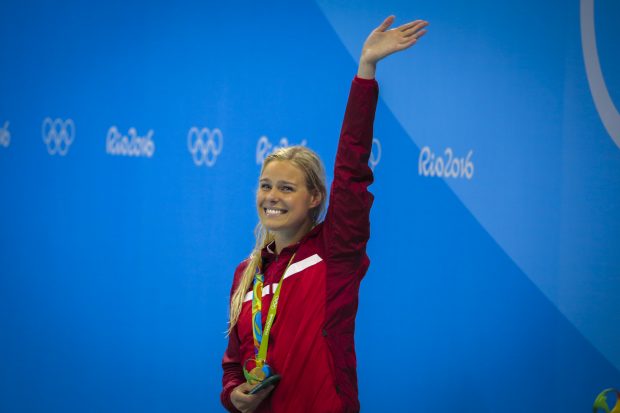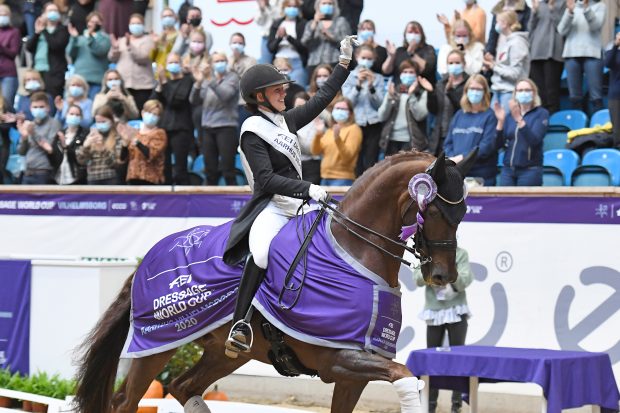News
Death threats, harassment and utter filth: another day in the pro-athlete’s inbox
This article is more than 4 years old.
In the world of sport, offensive chants, slogans or banners are often subject to media scrutiny. But abuse in the virtual realm can be even more insidious
For Olympic gold medal-winning swimmer Pernille Blume, champion dressage rider Cathrine Dufour and national team handball player Anne Mette Hansen, online harassment and abuse have become daily occurrences, reports DR.
Though fan culture is largely supportive, the virtual realm can be a darker space. The three Danish athletes each have over 350,000 followers on Instagram – where much of the negativity takes place.
Despite their sporting triumphs, Blume has been sent death threats, online trolls have accused Dufour of animal abuse, and Hansen has deleted her Facebook account due to offensive messages.
Death threats and “disgusting comments”
“It’s actually really scary,” says Blume. “The tone on social media has become too violent.”
Some of her worst abuse followed the European Championships in 2018.
“I chose to swim my 100-meter semifinal in a different style. I got sent death threats. They said I should be deported and immediately removed from the world of sports,” she recalled.
“It hits hard – no matter how thick-skinned you are.”
The “disgusting comments” have made her so anxious that she now deletes any messages immediately.

Pernille Blume waves to supporters at the 2016 Rio Olympics (photo: Danilo Borges/Flickr)
“On good days you can handle it, but if you’ve had a bad day, it’s hard”
For handballer Hansen, the only solution was to delete all her social media accounts.
“I deleted my Facebook app during the European Championships for the sole reason that I didn’t want to see the comments. I don’t even look at pictures on the women’s national team’s own page because I don’t want to read those hurtful things,” she said.
The 26-year-old plays for Györ – one of the world’s best women’s handball clubs. She’s used to having her performance evaluated – but slurs on her fan page like “you unsportsmanlike bitch” and “you don’t belong on the national team” are another story.

Anne Mette Hansen plays left-back for Hungarian team Györ (photo: Anne Mette Hansen/ Facebook)
“On good days you can handle it, but if you’ve had a bad day, it’s hard. Most athletes are super self-critical. They know only too well if they’ve performed poorly. You don’t need to read 15 strangers’ word-vomit,” she said.
The women’s national team have begun advising players to avoid too much phone time in the lead-up to big matches.
Anti-LGBT insults
Dressage rider Dufour began sharing ‘behind-the-scenes’ posts to give something back to younger riders. But the cyber abuse she received has put her off.
“I’ve been called an animal abuser. And I’ve had messages about my sexuality,” says Dufour, who got engaged to girlfriend Rasmine Laudrup after winning the Danish Grand Prix Championship last year.
“I can shake off comments about my relationship, but accusations about how I treat my horses really hurt. I’m doing all I can – day and night – to make my animals feel as good as possible” says Dufour.

Cathrine Dufour during the 2020 Dressage World Cup (photo: Annette Boe Østergaard/Flickr)
Tackling the trolls
Rather than combat the messages online, she takes a head-on approach: “I contacted a girl who had been extremely harsh over a long period on Facebook. She was sending me pictures every week for a few years and was really rude.”
“They’re completely different when you get them on the phone. They lie down and apologise. I’m not calling to have a discussion; I’m calling to tell them that their messages hurt,” she added.
Cyber bullying is nothing new
A well-documented rise in online abuse has followed fan-culture’s shift onto social media, according to Christian Mogensen from the Center for Digital Pedagogy.
“[Social Media] creates a distance where normally unacceptable language is used to talk to athletes,” he contends.
“We have a morbid fascination with the comments section, so many platforms are extremely bad at regulating them. We’re quick to break out the popcorn when someone’s getting flamed.”
It’s tempting to fight fire with fire but it only “makes it worse”, he warns.
If you’re receiving threats, Mogensen has one piece of advice: report it to the police. Unfortunately it’s trickier to deal with general abuse that doesn’t explicitly break the law.
Time to speak up: “It shouldn’t just be swept under the rug”
That’s not to say that sports-people like Pernille Blume, Cathrine Dufour and Anne Mette Hansen must tacitly accept the situation.
“You can be a part of the game and at the same time complain about the rules. And you need to be on social media today. In my world, that means you have a responsibility to help sports-people feel supported,” Mogensen says.
For better or worse, social media is a part of the modern sporting landscape, and sadly the three Danish sports-people’s experiences aren’t unique.
“It shouldn’t just be swept under the rug. People have to know this is happening,” says Hansen.
By speaking up, they hope to spotlight the darker aspects of online sporting culture, and the real-life effects of online hatred.
“It’s about articulating the problem” they agree. “So we can start to fix it.”










































